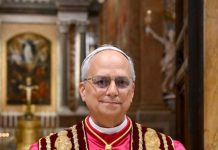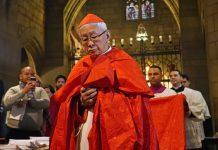Cardinal Gerhard Mueller was made Prefect of the Congregation for the Doctrine of the Faith by Pope Benedict XVI and served from 2012 until 2017. Today, he shared his points of view on Traditionis Custodes and on the latest Traditional Latin Mass restrictions.
Newsdesk (July 19, 2021 2:38 PM, Gaudium Press) While some voices should be silent, some other voices should speak aloud. Why? Because the latter deserve to be listened to. And indeed, very attentively.
After the impact produced by the motu proprio Traditionis Custodes – strongly restricting the use of the 1962 Missal, also known as the Missal of St. Pius V, among other provisions – Catholic intellectuals from all over the world have been anticipating Cardinal Gerhard Müller’s points of view. He is the former Prefect of the Doctrine of the Faith (CDF).
In the English language, his considerations on the topic were published by The Catholic Thing. We offer our readers a substantial part of them, with subtitles by Gaudium Press editorial staff.
Cardinal Müller acknowledges the intention expressed in the motu proprio to “secure or restore the unity of the Church” by the drastic restriction of ancient liturgical usages. Yet, according to him, it is a “condemnation of the Extraordinary Form [of the Roman rite] to extinction in the long run.”
Amidst Traditionis Custodes provisions, Cardinal Müller would have wished for “a strict and logically comprehensible theological argumentation,” instead of demands for mere obedience.
He states that “For the unity in the confession of the revealed Faith and the celebration of the mysteries of grace in the seven sacraments by no means require sterile uniformity in the external liturgical form, as if the Church were like one of the international hotel chains with their homogenous design. The unity of believers with one another is rooted in unity in God through Faith, hope, and love and has nothing to do with uniformity in appearance, the lockstep of a military formation, or the groupthink of the big-tech age.”
“Even after the Council of Trent – underlines Cardinal Muller, there always was a certain diversity (musical, celebratory, regional) in the liturgical organization of Masses. The intention of Pope Pius V was not to suppress the variety of rites, but rather to curb the abuses that had led to a devastating lack of understanding among the Protestant Reformers regarding the substance of the sacrifice of the Mass (its Sacrificial character and Real Presence). In the Missal of Paul VI, ritualistic (rubricist) homogenization is broken up, precisely in order to overcome a mechanical execution in favor of an inner and outer active participation of all believers in their respective languages and cultures. The unity of the Latin rite, however, should be preserved through the same basic liturgical structure and the precise orientation of the translations to the Latin original.”
Verba Domini: Attempts to ‘improve’ it, may further affect the unity of the Church
“The Roman Church must not pass on its responsibility for unity in cult to the Bishops’ Conferences. Rome must oversee translation of the normative texts of the Missal of Paul VI, and even of the biblical texts, that might obscure the contents of the Faith. Presumptions that one may “improve” the verba domini (e.g. pro multis – “for many” – at the consecration, the et ne nos inducas in tentationem – “and lead us not into temptation” – in the Our Father), contradict the truth of the Faith and the unity of the Church much more than celebrating Mass according to the Missal of John XXIII,” Cardinal Müller notes.
“Naturally, the pope, in his concern for the unity of the Church in the revealed faith, is to be fully supported when the celebration of Holy Mass according to the Missal of 1962 is an expression of resistance to the authority of Vatican II, which is to say, when the doctrine of the faith and the Church’s ethics are relativized or even denied in the liturgical and pastoral order,” he states.
A Church that is neither the ‘old’ nor the ‘new’ one
Cardinal Müller elaborates on what he calls the “unconditional recognition of Vatican II” present in Traditionis Custodes. “Nobody can call himself a Catholic who either wants to go back behind Vatican II (or any other council recognized by the pope) as the time of the “true” Church or wants to leave that Church behind as an intermediate step towards a “new Church.” One may measure Pope Francis’ will to return to unity the deplored so-called “traditionalists” (i.e., those opposed to the Missal of Paul VI) against the degree of his determination to put an end to the innumerable “progressivist” abuses of the liturgy (renewed in accordance with Vatican II) that are tantamount to blasphemy. The paganization of the Catholic liturgy – which is in its essence nothing other than the worship of the One and Triune God – through the mythologization of nature, the idolatry of environment and climate, as well as the Pachamama spectacle, were rather counterproductive for the restoration and renewal of a dignified and orthodox liturgy reflective of the fulness of the Catholic Faith.”
The German ‘Synodal Way’: A serious attack on the unity of the Church
“Nobody can turn a blind eye to the fact that even those priests and laypeople who celebrate Mass according to the order of the Missal of St. Paul VI are now being widely decried as traditionalist. The teachings of Vatican II on the uniqueness of redemption in Christ, the full realization of the Church of Christ in the Catholic Church, the inner essence of the Catholic liturgy as adoration of God and mediation of grace, Revelation and its presence in Scripture and Apostolic Tradition, the infallibility of the magisterium, the primacy of the pope, the sacramentality of the Church, the dignity of the priesthood, the holiness and indissolubility of marriage – all these are being heretically denied in open contradiction to Vatican II by a majority of German bishops and lay functionaries (even if disguised under pastoral phrases).”
In this line, Cardinal Müller lays several examples: “And despite all the apparent enthusiasm they express for Pope Francis, they are flatly denying the authority conferred on him by Christ as the successor of Peter. The Congregation for the Doctrine of the Faith’s document about the impossibility of legitimizing same-sex and extramarital sexual contacts through a blessing is ridiculed by German (and not only German) bishops, priests, and theologians as merely the opinion of under-qualified curial officials. Here we have a threat to the unity of the Church in revealed Faith, reminiscent of the size of the Protestant secession from Rome in the sixteenth century. Given the disproportion between the relatively modest response to the massive attacks on the unity of the Church in the German “Synodal Way” (as well as in other pseudo-reforms) and the harsh disciplining of the old ritual minority, the image of the misguided fire brigade comes to mind, which – instead of saving the blazing house – instead first saves the small barn next to it.”
Sometimes the sheep receive no hugs but blows
“Without the slightest empathy, one ignores the religious feelings of the (often young) participants in the Masses according to the Missal John XXIII (1962). Instead of appreciating the smell of the sheep, the shepherd here hits them hard with his crook. It also seems simply unjust to abolish celebrations of the “old” rite just because it attracts some problematic people: abusus non tollit usum“, Cardinal Müller says, recalling the ancient Latin proverb: “abuse does not cancel use.“
The German cardinal recalls that the formula stated in Traditionis Custodes, lex orandi-lex credendi (Rule of prayer-Rule of Faith), refers “to the substance of the sacraments (in signs and words) but not the liturgical rite, of which there were several (with different variants) in the patristic era. One cannot simply declare the latest Missal to be the only valid norm of the Catholic faith without distinguishing between the ‘part that is unchangeable by virtue of divine institution and the parts that are subject to change.’ (Sacrosanctum Concilium 21). The changing liturgical rites do not represent a different faith, but rather testify to the one and the same Apostolic Faith of the Church in its different expressions”.
“The Missal of John XXIII, (…) contains the substance of the Eucharist instituted by Christ.”
“The pope’s letter confirms that he allows the celebration according to the older form under certain conditions. He rightly points to the centrality of the Roman canon in the more recent Missal as the heart of the Roman rite. This guarantees the crucial continuity of the Roman liturgy in its essence, organic development, and inner unity. To be sure, one expects the lovers of the ancient liturgy to recognize the renewed liturgy; just as the followers of the Paul VI Missal also have to confess that the Mass according to the Missal of John XXIII is a true and valid Catholic liturgy, that is, it contains the substance of the Eucharist instituted by Christ and, therefore, there is and can only be ‘the one Mass of all times’.”
“A little more knowledge of Catholic dogmatics and the history of the liturgy could counteract the unfortunate formation of opposing parties and also save the bishops from the temptation to act in an authoritarian, loveless, and narrow-minded manner against the supporters of the ‘old’ Mass. The bishops are appointed as shepherds by the Holy Spirit: ‘Keep watch over yourselves and all the flock of which the Holy Spirit has made you overseers. Be shepherds of the Church of God, which he bought with his own blood.’ (Acts 20, 28) They are not merely representatives of a central office – with opportunities for advancement. The good shepherd can be recognized by the fact that he worries more about the salvation of souls than recommending himself to a higher authority by subservient ‘good behavior.’ (1 Peter 5, 1-4) If the law of non-contradiction still applies, one cannot logically castigate careerism in the Church and at the same time promote careerist”.
Cardinal Müller hopes that “the Congregations for Religious and for Divine Worship, with their new authority, do not become inebriated by power and think they have to wage a campaign of destruction against the communities of the old rite – in the foolish belief that by doing so they are rendering a service to the Church and promoting Vatican II.”
By Saúl Castiblanco/Gaudiumpress
Compiled by Gustavo Kralj







































